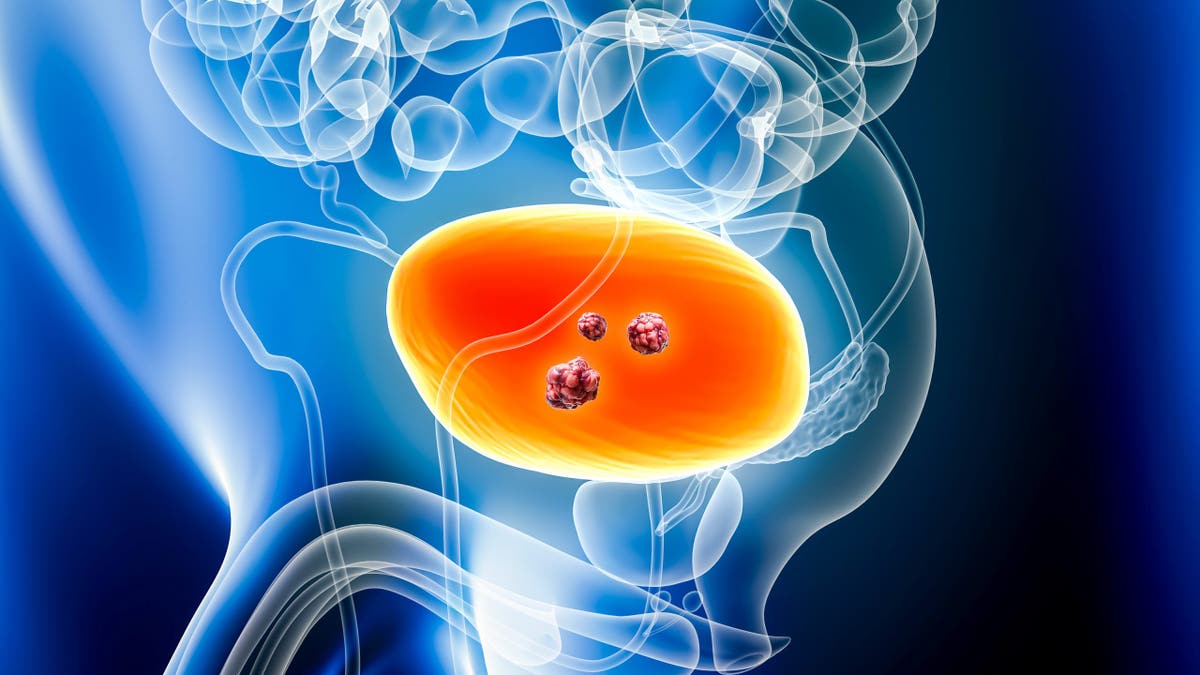

After Hall of Fame athlete Deion Sanders’ announcement that he battled bladder cancer, doctors are sharing warning signs to monitor.
Sanders, who is currently head football coach at the University of Colorado Boulder, spoke about his medical struggles during a Monday press conference held at Folsom Field in Boulder.
The former NFL and MLB star, 57, appeared alongside his care team and representatives from University of Colorado Health (UC Health) and University of Colorado Anschutz Medical Campus (CU Anschutz).
MAN'S DEADLY BRAIN CANCER TUMOR DISAPPEARS AFTER EXPERIMENTAL DRUG TRIAL
Sanders was diagnosed with "very high-risk, non-muscle invasive bladder cancer," but is now cancer-free, according to a statement from his oncologist.
"We removed the tumor. It was very high-grade and invading through the bladder wall," said Dr. Janet Kukreja, urological oncology director at CU Anshutz. "I am pleased to report that the results from the surgery are that he is cured from the cancer."

Head coach Deion Sanders of the University of Colorado speaks about his journey beating bladder cancer during a press conference in the Touchdown Club at Folsom Field in Boulder, Colorado, on July 28, 2025. (Getty Images)
The oncologist noted that Sanders’ type of cancer has a very high rate of recurrence and progression.
Treating the disease within the bladder would require a long series of treatments over a three-year period, and there would still be a 50% chance of the cancer coming back.
The cancer could also have spread to the muscle, the doctor said, which happens in about half of cases.
CANCER COULD BE DETECTED THREE YEARS BEFORE DIAGNOSIS WITH EXPERIMENTAL BLOOD TEST
"Only about 10% of people live five years, even with our current medical treatment, if it metastasizes," she said.
Together with his care team, Sanders made the decision to have a bladder removal, in which surgeons performed a "full robot-assisted laparoscopic bladder removal" and created a new bladder.
"It is a new way of life. And it is a learning curve for sure."
"It’s a laparoscopic surgery where we attach a robot to the patient, and then we do all the maneuvering of the robot," Kukreja said. "And then once the bladder comes out, we also take some lymph nodes to make sure it hasn't spread, and then we make a new bladder using [the patient’s] own intestines."
"It is a new way of life. And it is a learning curve for sure."

The former NFL and MLB star, 57, appeared alongside his care team and representatives from University of Colorado Health (UC Health) and University of Colorado Anschutz Medical Campus (CU Anschutz). (Getty Images)
Lauren Askevold, an athletic trainer at the University of Colorado, shared that Sanders’ bladder tumor was discovered inadvertently during a CT scan to monitor his heart health.
Sanders, who lost 25 pounds during the course of his cancer journey, said he is thankful and urged others to be aware of warning signs and to seek medical attention.
RARE CANCER DIAGNOSES SURGE DRAMATICALLY AMONG MILLENNIALS AND GEN X
"It's been a tremendous journey. It has been tough," he said at the press conference. "Everybody get checked out, because if it wasn't for me getting tested for something else, they wouldn't have stumbled upon this."
"And make sure you go to the get the right care. Because without wonderful people like this, I probably wouldn't be sitting here today, because it grew so expeditiously."
Sanders also spoke about his struggles with using a catheter and no longer having control of his bladder, noting that "it’s a whole life change."
"Blood in the urine in the absence of infection is never normal and should always get checked out."
"I know a lot of people out there are going through what I'm going through and dealing with what I'm dealing with, and let's stop being ashamed of it — let's deal with it head-on," he said.
Sanders said he is feeling strong and ready to coach again. "It was never in my spirit, in my heart, that God wouldn't allow me to coach again."

"It's been a tremendous journey. It has been tough," Sanders said at the press conference. (Getty Images)
Kukreja noted that Sanders’ outlook is "very good."
"We'll just keep him on routine surveillance scans. Other than that, nothing else."
Although Sanders said he had "no signs whatsoever," Kukreja emphasized the importance of people being aware of any red flags for bladder cancer, which is the fourth most common cancer in men.
"The early signs are usually blood in the urine," she said during the press conference. "Blood in the urine in the absence of infection is never normal and should always get checked out."
Even in the absence of symptoms, Kukreja recommends regularly seeing a primary care doctor, eating well and abstaining from smoking.
"Coach was never a smoker, and one of the people that just unfortunately got bladder cancer," she said. "But that's also something that's very heavily associated with bladder cancer."

Early signs of bladder cancer typically include blood in the urine. Less common signs include strong urges to urinate and frequent urination with mild discomfort that does not subside with common treatments.
Dr. Chad Ryan Ritch, M.D., a urologic oncologist at the University of Miami Health System, did not treat Sanders but shared input on bladder cancer warning signs.
"The main sign is the presence of visible (or microscopic) blood in the urine, without pain and in the absence of infection or trauma," he told Fox News Digital.
Less common signs, according to Ritch, include strong urges to urinate and frequent urination with mild discomfort that does not subside with common treatments.
"These are known as irritative voiding symptoms," he noted.
In advanced cases, some patients may experience urinary obstruction with blockage of the ureter, which connects the kidney to the bladder.

Sanders' doctor emphasized the importance of people being aware of any red flags for bladder cancer, which is the fourth most common cancer in men. (iStock)
"This may present as pain in the flank and should not be ignored, especially if it occurs with blood in the urine and without other identifiable causes, such as infection or trauma," said Ritch.
The doctor reiterated that the most common cause of urothelial bladder cancer in the U.S. is smoking — "thus, quitting and avoiding tobacco smoking is the best prevention."
For more Health articles, visit www.foxnews.com/health
"Chronic urinary tract infections and decades of bladder inflammation from instrumentation such as catheters may also cause squamous cell bladder cancer," Ritch added.
"The take-home message is that if you have these risk factors and have visible or microscopic blood in the urine, then it is important to see a doctor."
